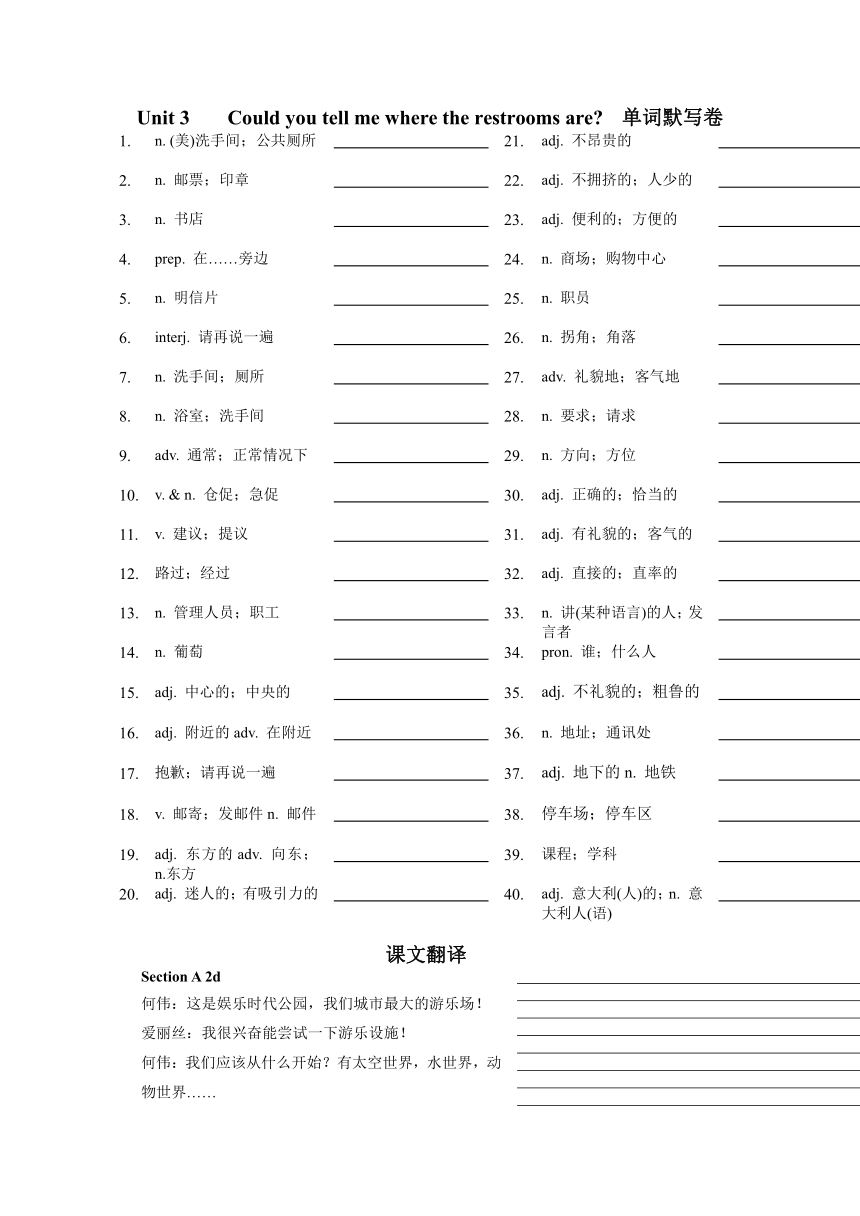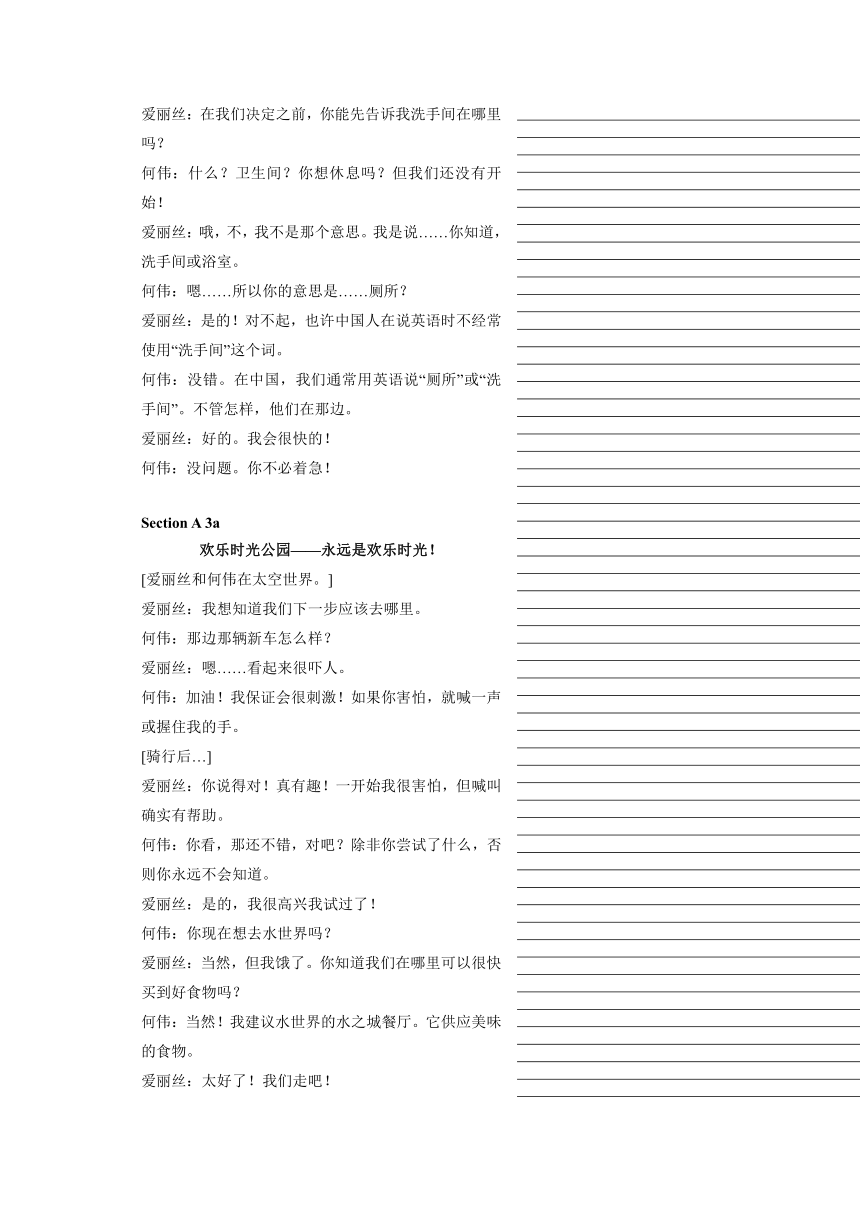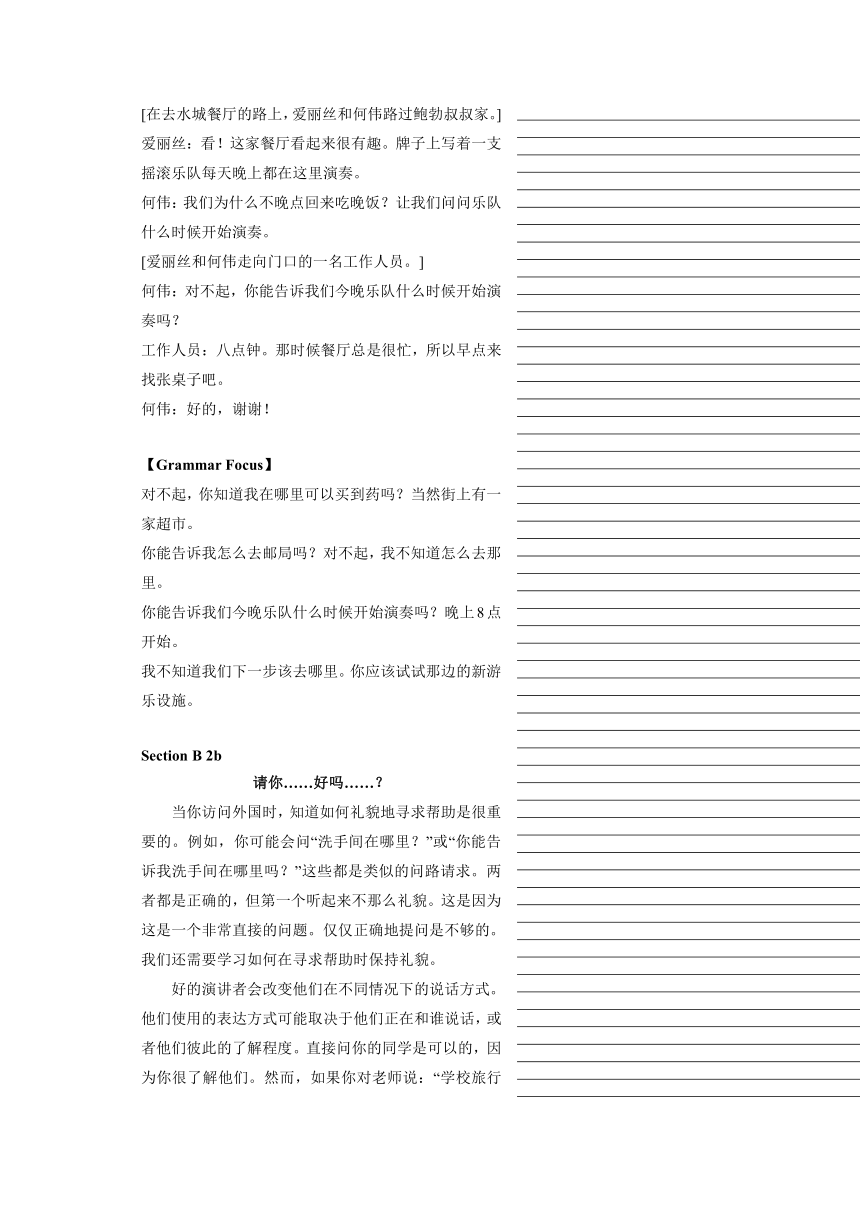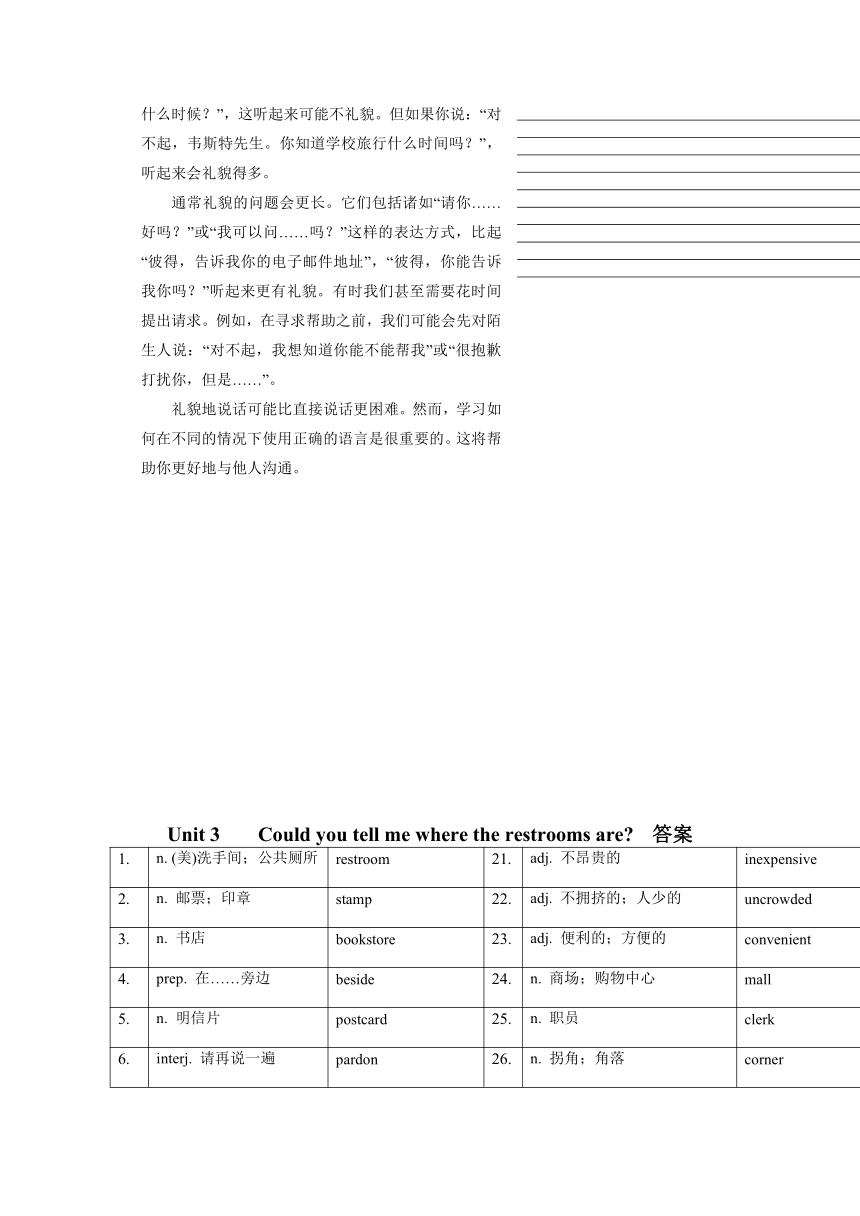Unit 3 Could you tell me where the restrooms are 单词课文默写卷 2022-2023学年人教版九年级英语全册(含答案)
文档属性
| 名称 | Unit 3 Could you tell me where the restrooms are 单词课文默写卷 2022-2023学年人教版九年级英语全册(含答案) |  | |
| 格式 | docx | ||
| 文件大小 | 35.6KB | ||
| 资源类型 | 教案 | ||
| 版本资源 | 人教新目标(Go for it)版 | ||
| 科目 | 英语 | ||
| 更新时间 | 2023-02-16 11:19:05 | ||
图片预览




文档简介
Unit 3 Could you tell me where the restrooms are 单词默写卷
1. n. (美)洗手间;公共厕所 21. adj. 不昂贵的
2. n. 邮票;印章 22. adj. 不拥挤的;人少的
3. n. 书店 23. adj. 便利的;方便的
4. prep. 在……旁边 24. n. 商场;购物中心
5. n. 明信片 25. n. 职员
6. interj. 请再说一遍 26. n. 拐角;角落
7. n. 洗手间;厕所 27. adv. 礼貌地;客气地
8. n. 浴室;洗手间 28. n. 要求;请求
9. adv. 通常;正常情况下 29. n. 方向;方位
10. v. & n. 仓促;急促 30. adj. 正确的;恰当的
11. v. 建议;提议 31. adj. 有礼貌的;客气的
12. 路过;经过 32. adj. 直接的;直率的
13. n. 管理人员;职工 33. n. 讲(某种语言)的人;发言者
14. n. 葡萄 34. pron. 谁;什么人
15. adj. 中心的;中央的 35. adj. 不礼貌的;粗鲁的
16. adj. 附近的adv. 在附近 36. n. 地址;通讯处
17. 抱歉;请再说一遍 37. adj. 地下的n. 地铁
18. v. 邮寄;发邮件n. 邮件 38. 停车场;停车区
19. adj. 东方的adv. 向东;n.东方 39. 课程;学科
20. adj. 迷人的;有吸引力的 40. adj. 意大利(人)的;n. 意大利人(语)
课文翻译
Section A 2d 何伟:这是娱乐时代公园,我们城市最大的游乐场! 爱丽丝:我很兴奋能尝试一下游乐设施! 何伟:我们应该从什么开始?有太空世界,水世界,动物世界…… 爱丽丝:在我们决定之前,你能先告诉我洗手间在哪里吗? 何伟:什么?卫生间?你想休息吗?但我们还没有开始! 爱丽丝:哦,不,我不是那个意思。我是说……你知道,洗手间或浴室。 何伟:嗯……所以你的意思是……厕所? 爱丽丝:是的!对不起,也许中国人在说英语时不经常使用“洗手间”这个词。 何伟:没错。在中国,我们通常用英语说“厕所”或“洗手间”。不管怎样,他们在那边。 爱丽丝:好的。我会很快的! 何伟:没问题。你不必着急! Section A 3a 欢乐时光公园——永远是欢乐时光! [爱丽丝和何伟在太空世界。] 爱丽丝:我想知道我们下一步应该去哪里。 何伟:那边那辆新车怎么样? 爱丽丝:嗯……看起来很吓人。 何伟:加油!我保证会很刺激!如果你害怕,就喊一声或握住我的手。 [骑行后…] 爱丽丝:你说得对!真有趣!一开始我很害怕,但喊叫确实有帮助。 何伟:你看,那还不错,对吧?除非你尝试了什么,否则你永远不会知道。 爱丽丝:是的,我很高兴我试过了! 何伟:你现在想去水世界吗? 爱丽丝:当然,但我饿了。你知道我们在哪里可以很快买到好食物吗? 何伟:当然!我建议水世界的水之城餐厅。它供应美味的食物。 爱丽丝:太好了!我们走吧! [在去水城餐厅的路上,爱丽丝和何伟路过鲍勃叔叔家。] 爱丽丝:看!这家餐厅看起来很有趣。牌子上写着一支摇滚乐队每天晚上都在这里演奏。 何伟:我们为什么不晚点回来吃晚饭?让我们问问乐队什么时候开始演奏。 [爱丽丝和何伟走向门口的一名工作人员。] 何伟:对不起,你能告诉我们今晚乐队什么时候开始演奏吗? 工作人员:八点钟。那时候餐厅总是很忙,所以早点来找张桌子吧。 何伟:好的,谢谢! 【Grammar Focus】 对不起,你知道我在哪里可以买到药吗?当然街上有一家超市。 你能告诉我怎么去邮局吗?对不起,我不知道怎么去那里。 你能告诉我们今晚乐队什么时候开始演奏吗?晚上8点开始。 我不知道我们下一步该去哪里。你应该试试那边的新游乐设施。 Section B 2b 请你……好吗……? 当你访问外国时,知道如何礼貌地寻求帮助是很重要的。例如,你可能会问“洗手间在哪里?”或“你能告诉我洗手间在哪里吗?”这些都是类似的问路请求。两者都是正确的,但第一个听起来不那么礼貌。这是因为这是一个非常直接的问题。仅仅正确地提问是不够的。我们还需要学习如何在寻求帮助时保持礼貌。 好的演讲者会改变他们在不同情况下的说话方式。他们使用的表达方式可能取决于他们正在和谁说话,或者他们彼此的了解程度。直接问你的同学是可以的,因为你很了解他们。然而,如果你对老师说:“学校旅行什么时候?”,这听起来可能不礼貌。但如果你说:“对不起,韦斯特先生。你知道学校旅行什么时间吗?”,听起来会礼貌得多。 通常礼貌的问题会更长。它们包括诸如“请你……好吗?”或“我可以问……吗?”这样的表达方式,比起“彼得,告诉我你的电子邮件地址”,“彼得,你能告诉我你吗?”听起来更有礼貌。有时我们甚至需要花时间提出请求。例如,在寻求帮助之前,我们可能会先对陌生人说:“对不起,我想知道你能不能帮我”或“很抱歉打扰你,但是……”。 礼貌地说话可能比直接说话更困难。然而,学习如何在不同的情况下使用正确的语言是很重要的。这将帮助你更好地与他人沟通。
Unit 3 Could you tell me where the restrooms are 答案
1. n. (美)洗手间;公共厕所 restroom 21. adj. 不昂贵的 inexpensive
2. n. 邮票;印章 stamp 22. adj. 不拥挤的;人少的 uncrowded
3. n. 书店 bookstore 23. adj. 便利的;方便的 convenient
4. prep. 在……旁边 beside 24. n. 商场;购物中心 mall
5. n. 明信片 postcard 25. n. 职员 clerk
6. interj. 请再说一遍 pardon 26. n. 拐角;角落 corner
7. n. 洗手间;厕所 washroom 27. adv. 礼貌地;客气地 politely
8. n. 浴室;洗手间 bathroom 28. n. 要求;请求 request
9. adv. 通常;正常情况下 normally 29. n. 方向;方位 direction
10. v. & n. 仓促;急促 rush 30. adj. 正确的;恰当的 correct
11. v. 建议;提议 suggest 31. adj. 有礼貌的;客气的 polite
12. 路过;经过 pass by 32. adj. 直接的;直率的 direct
13. n. 管理人员;职工 staff 33. n. 讲(某种语言)的人;发言者 speaker
14. n. 葡萄 grape 34. pron. 谁;什么人 whom
15. adj. 中心的;中央的 central 35. adj. 不礼貌的;粗鲁的 impolite
16. adj. 附近的adv. 在附近 nearby 36. n. 地址;通讯处 address
17. 抱歉;请再说一遍 pardon me 37. adj. 地下的n. 地铁 underground
18. v. 邮寄;发邮件n. 邮件 mail 38. 停车场;停车区 parking lot
19. adj. 东方的adv. 向东;n.东方 east 39. 课程;学科 course
20. adj. 迷人的;有吸引力的 fascinating 40. adj. 意大利(人)的;n. 意大利人(语) Italian
课文翻译
Section A 2d 何伟:这是娱乐时代公园,我们城市最大的游乐场! 爱丽丝:我很兴奋能尝试一下游乐设施! 何伟:我们应该从什么开始?有太空世界,水世界,动物世界…… 爱丽丝:在我们决定之前,你能先告诉我洗手间在哪里吗? 何伟:什么?卫生间?你想休息吗?但我们还没有开始! 爱丽丝:哦,不,我不是那个意思。我是说……你知道,洗手间或浴室。 何伟:嗯……所以你的意思是……厕所? 爱丽丝:是的!对不起,也许中国人在说英语时不经常使用“洗手间”这个词。 何伟:没错。在中国,我们通常用英语说“厕所”或“洗手间”。不管怎样,他们在那边。 爱丽丝:好的。我会很快的! 何伟:没问题。你不必着急! Section A 3a 欢乐时光公园——永远是欢乐时光! [爱丽丝和何伟在太空世界。] 爱丽丝:我想知道我们下一步应该去哪里。 何伟:那边那辆新车怎么样? 爱丽丝:嗯……看起来很吓人。 何伟:加油!我保证会很刺激!如果你害怕,就喊一声或握住我的手。 [骑行后…] 爱丽丝:你说得对!真有趣!一开始我很害怕,但喊叫确实有帮助。 何伟:你看,那还不错,对吧?除非你尝试了什么,否则你永远不会知道。 爱丽丝:是的,我很高兴我试过了! 何伟:你现在想去水世界吗? 爱丽丝:当然,但我饿了。你知道我们在哪里可以很快买到好食物吗? 何伟:当然!我建议水世界的水之城餐厅。它供应美味的食物。 爱丽丝:太好了!我们走吧! [在去水城餐厅的路上,爱丽丝和何伟路过鲍勃叔叔家。] 爱丽丝:看!这家餐厅看起来很有趣。牌子上写着一支摇滚乐队每天晚上都在这里演奏。 何伟:我们为什么不晚点回来吃晚饭?让我们问问乐队什么时候开始演奏。 [爱丽丝和何伟走向门口的一名工作人员。] 何伟:对不起,你能告诉我们今晚乐队什么时候开始演奏吗? 工作人员:八点钟。那时候餐厅总是很忙,所以早点来找张桌子吧。 何伟:好的,谢谢! 【Grammar Focus】 对不起,你知道我在哪里可以买到药吗?当然街上有一家超市。 你能告诉我怎么去邮局吗?对不起,我不知道怎么去那里。 你能告诉我们今晚乐队什么时候开始演奏吗?晚上8点开始。 我不知道我们下一步该去哪里。你应该试试那边的新游乐设施。 Section B 2b 请你……好吗……? 当你访问外国时,知道如何礼貌地寻求帮助是很重要的。例如,你可能会问“洗手间在哪里?”或“你能告诉我洗手间在哪里吗?”这些都是类似的问路请求。两者都是正确的,但第一个听起来不那么礼貌。这是因为这是一个非常直接的问题。仅仅正确地提问是不够的。我们还需要学习如何在寻求帮助时保持礼貌。 好的演讲者会改变他们在不同情况下的说话方式。他们使用的表达方式可能取决于他们正在和谁说话,或者他们彼此的了解程度。直接问你的同学是可以的,因为你很了解他们。然而,如果你对老师说:“学校旅行什么时候?”,这听起来可能不礼貌。但如果你说:“对不起,韦斯特先生。你知道学校旅行什么时间吗?”,听起来会礼貌得多。 通常礼貌的问题会更长。它们包括诸如“请你……好吗?”或“我可以问……吗?”这样的表达方式,比起“彼得,告诉我你的电子邮件地址”,“彼得,你能告诉我你吗?”听起来更有礼貌。有时我们甚至需要花时间提出请求。例如,在寻求帮助之前,我们可能会先对陌生人说:“对不起,我想知道你能不能帮我”或“很抱歉打扰你,但是……”。 礼貌地说话可能比直接说话更困难。然而,学习如何在不同的情况下使用正确的语言是很重要的。这将帮助你更好地与他人沟通。 Section A 2d He Wei: This is Fun Times Park, the biggest amusement park in our city! Alice: I’m excited to try the rides! He Wei: What should we start with There’s Space World, Water World, Animal World ... Alice: Before we decide, could you first tell me where the restrooms are He Wei: Pardon Restroom You want to rest But we haven’t even started yet! Alice: Oh no, I don’t mean that. I mean ... you know, a washroom or bathroom. He Wei: Hmm ... so you mean ... the toilet Alice: Yes! Sorry, maybe people in China don’t often use the word “restroom” when they speak English. He Wei: That’s right. In China, we normally say “toilet”or “washroom” in English. Anyway, they’re over there. Alice: OK. I’ll be quick!
He Wei: No problem. You don’t need to rush! Section A 3a Fun Times Park — Always a Fun Time! [Alice and He Wei are in Space World.] Alice: I wonder where we should go next. He Wei: How about that new ride over there Alice: Well ... it looks scary. He Wei: Come on! I promise it’ll be exciting! If you’re scared, just shout or hold my hand. [After the ride..] Alice: You were right! That was fun! I was scared at first, but shouting did help. He Wei: See, that wasn’t so bad, right You never know until you try something. Alice: Yes, I’m so glad I tried it! He Wei: Do you want to go to Water World now Alice: Sure, but I’m getting hungry. Do you know where we can get some good food quickly He Wei: Of course! I suggest Water City Restaurant in Water World. It serves delicious food. Alice: Great! Let’s go! [On their way to Water City Restaurant, Alice and He Wei pass by Uncle Bob’s.] Alice: Look! This restaurant looks interesting. The sign says a rock band plays here every evening. He Wei: Why don’t we come back here for dinner later Let’s ask what time the band starts playing. [Alice and He Wei walk up to a staff person at the door.] He Wei: Excuse me, could you tell us when the band starts playing this evening Staff: Eight o’clock. The restaurant is always busy at that time, so come a little earlier to get a table. He Wei: OK. Thank you! Grammar Focus Excuse me, do you know where I can buy some medicine Sure. There’s a supermarket down the street. Could you please tell me how to get to the post office Sorry, I’m not sure how to get there. Could you tell us when the band starts playing this evening It starts at 8:00 p.m. I wonder where we should go next. You should try that new ride over there. Section B 2b Could You Please ... When you visit a foreign country, it is important to know how to ask for help politely. For example, you may ask “Where are the restrooms ” or “Could you please tell me where the restrooms are ” These are similar requests for directions. Both are correct, but the first one sounds less polite. That is because it is a very direct question. It is not enough to just ask a question correctly. We also need to learn how to be polite when we ask for help. Good speakers change the way they speak in different situations. The expressions they use might depend on whom they are speaking to or how well they know each other. It is all right to ask your classmates direct questions because you know them well. However, if you say to your teacher, “When is the school trip ’’, this might sound impolite. But if you say, “Excuse me, Mr. West. Do you know when the school trip is ’’, this will sound much more polite. Usually polite questions are longer. They include expressions such as “Could you please ... ” or “May I ask ... ” It sounds more polite to say, “Peter, could you please tell me your e-mail address ” than “Peter, tell me your e-mail address.” Sometimes we even need to spend time leading into a request. For example, we might first say to a stranger, “Excuse me, I wonder if you can help me” or “I’m sorry to trouble you, but ...” before asking for help. It might seem more difficult to speak politely than directly. However, it is important to learn how to use the right language in different situations. This will help you communicate better with other people.
1. n. (美)洗手间;公共厕所 21. adj. 不昂贵的
2. n. 邮票;印章 22. adj. 不拥挤的;人少的
3. n. 书店 23. adj. 便利的;方便的
4. prep. 在……旁边 24. n. 商场;购物中心
5. n. 明信片 25. n. 职员
6. interj. 请再说一遍 26. n. 拐角;角落
7. n. 洗手间;厕所 27. adv. 礼貌地;客气地
8. n. 浴室;洗手间 28. n. 要求;请求
9. adv. 通常;正常情况下 29. n. 方向;方位
10. v. & n. 仓促;急促 30. adj. 正确的;恰当的
11. v. 建议;提议 31. adj. 有礼貌的;客气的
12. 路过;经过 32. adj. 直接的;直率的
13. n. 管理人员;职工 33. n. 讲(某种语言)的人;发言者
14. n. 葡萄 34. pron. 谁;什么人
15. adj. 中心的;中央的 35. adj. 不礼貌的;粗鲁的
16. adj. 附近的adv. 在附近 36. n. 地址;通讯处
17. 抱歉;请再说一遍 37. adj. 地下的n. 地铁
18. v. 邮寄;发邮件n. 邮件 38. 停车场;停车区
19. adj. 东方的adv. 向东;n.东方 39. 课程;学科
20. adj. 迷人的;有吸引力的 40. adj. 意大利(人)的;n. 意大利人(语)
课文翻译
Section A 2d 何伟:这是娱乐时代公园,我们城市最大的游乐场! 爱丽丝:我很兴奋能尝试一下游乐设施! 何伟:我们应该从什么开始?有太空世界,水世界,动物世界…… 爱丽丝:在我们决定之前,你能先告诉我洗手间在哪里吗? 何伟:什么?卫生间?你想休息吗?但我们还没有开始! 爱丽丝:哦,不,我不是那个意思。我是说……你知道,洗手间或浴室。 何伟:嗯……所以你的意思是……厕所? 爱丽丝:是的!对不起,也许中国人在说英语时不经常使用“洗手间”这个词。 何伟:没错。在中国,我们通常用英语说“厕所”或“洗手间”。不管怎样,他们在那边。 爱丽丝:好的。我会很快的! 何伟:没问题。你不必着急! Section A 3a 欢乐时光公园——永远是欢乐时光! [爱丽丝和何伟在太空世界。] 爱丽丝:我想知道我们下一步应该去哪里。 何伟:那边那辆新车怎么样? 爱丽丝:嗯……看起来很吓人。 何伟:加油!我保证会很刺激!如果你害怕,就喊一声或握住我的手。 [骑行后…] 爱丽丝:你说得对!真有趣!一开始我很害怕,但喊叫确实有帮助。 何伟:你看,那还不错,对吧?除非你尝试了什么,否则你永远不会知道。 爱丽丝:是的,我很高兴我试过了! 何伟:你现在想去水世界吗? 爱丽丝:当然,但我饿了。你知道我们在哪里可以很快买到好食物吗? 何伟:当然!我建议水世界的水之城餐厅。它供应美味的食物。 爱丽丝:太好了!我们走吧! [在去水城餐厅的路上,爱丽丝和何伟路过鲍勃叔叔家。] 爱丽丝:看!这家餐厅看起来很有趣。牌子上写着一支摇滚乐队每天晚上都在这里演奏。 何伟:我们为什么不晚点回来吃晚饭?让我们问问乐队什么时候开始演奏。 [爱丽丝和何伟走向门口的一名工作人员。] 何伟:对不起,你能告诉我们今晚乐队什么时候开始演奏吗? 工作人员:八点钟。那时候餐厅总是很忙,所以早点来找张桌子吧。 何伟:好的,谢谢! 【Grammar Focus】 对不起,你知道我在哪里可以买到药吗?当然街上有一家超市。 你能告诉我怎么去邮局吗?对不起,我不知道怎么去那里。 你能告诉我们今晚乐队什么时候开始演奏吗?晚上8点开始。 我不知道我们下一步该去哪里。你应该试试那边的新游乐设施。 Section B 2b 请你……好吗……? 当你访问外国时,知道如何礼貌地寻求帮助是很重要的。例如,你可能会问“洗手间在哪里?”或“你能告诉我洗手间在哪里吗?”这些都是类似的问路请求。两者都是正确的,但第一个听起来不那么礼貌。这是因为这是一个非常直接的问题。仅仅正确地提问是不够的。我们还需要学习如何在寻求帮助时保持礼貌。 好的演讲者会改变他们在不同情况下的说话方式。他们使用的表达方式可能取决于他们正在和谁说话,或者他们彼此的了解程度。直接问你的同学是可以的,因为你很了解他们。然而,如果你对老师说:“学校旅行什么时候?”,这听起来可能不礼貌。但如果你说:“对不起,韦斯特先生。你知道学校旅行什么时间吗?”,听起来会礼貌得多。 通常礼貌的问题会更长。它们包括诸如“请你……好吗?”或“我可以问……吗?”这样的表达方式,比起“彼得,告诉我你的电子邮件地址”,“彼得,你能告诉我你吗?”听起来更有礼貌。有时我们甚至需要花时间提出请求。例如,在寻求帮助之前,我们可能会先对陌生人说:“对不起,我想知道你能不能帮我”或“很抱歉打扰你,但是……”。 礼貌地说话可能比直接说话更困难。然而,学习如何在不同的情况下使用正确的语言是很重要的。这将帮助你更好地与他人沟通。
Unit 3 Could you tell me where the restrooms are 答案
1. n. (美)洗手间;公共厕所 restroom 21. adj. 不昂贵的 inexpensive
2. n. 邮票;印章 stamp 22. adj. 不拥挤的;人少的 uncrowded
3. n. 书店 bookstore 23. adj. 便利的;方便的 convenient
4. prep. 在……旁边 beside 24. n. 商场;购物中心 mall
5. n. 明信片 postcard 25. n. 职员 clerk
6. interj. 请再说一遍 pardon 26. n. 拐角;角落 corner
7. n. 洗手间;厕所 washroom 27. adv. 礼貌地;客气地 politely
8. n. 浴室;洗手间 bathroom 28. n. 要求;请求 request
9. adv. 通常;正常情况下 normally 29. n. 方向;方位 direction
10. v. & n. 仓促;急促 rush 30. adj. 正确的;恰当的 correct
11. v. 建议;提议 suggest 31. adj. 有礼貌的;客气的 polite
12. 路过;经过 pass by 32. adj. 直接的;直率的 direct
13. n. 管理人员;职工 staff 33. n. 讲(某种语言)的人;发言者 speaker
14. n. 葡萄 grape 34. pron. 谁;什么人 whom
15. adj. 中心的;中央的 central 35. adj. 不礼貌的;粗鲁的 impolite
16. adj. 附近的adv. 在附近 nearby 36. n. 地址;通讯处 address
17. 抱歉;请再说一遍 pardon me 37. adj. 地下的n. 地铁 underground
18. v. 邮寄;发邮件n. 邮件 mail 38. 停车场;停车区 parking lot
19. adj. 东方的adv. 向东;n.东方 east 39. 课程;学科 course
20. adj. 迷人的;有吸引力的 fascinating 40. adj. 意大利(人)的;n. 意大利人(语) Italian
课文翻译
Section A 2d 何伟:这是娱乐时代公园,我们城市最大的游乐场! 爱丽丝:我很兴奋能尝试一下游乐设施! 何伟:我们应该从什么开始?有太空世界,水世界,动物世界…… 爱丽丝:在我们决定之前,你能先告诉我洗手间在哪里吗? 何伟:什么?卫生间?你想休息吗?但我们还没有开始! 爱丽丝:哦,不,我不是那个意思。我是说……你知道,洗手间或浴室。 何伟:嗯……所以你的意思是……厕所? 爱丽丝:是的!对不起,也许中国人在说英语时不经常使用“洗手间”这个词。 何伟:没错。在中国,我们通常用英语说“厕所”或“洗手间”。不管怎样,他们在那边。 爱丽丝:好的。我会很快的! 何伟:没问题。你不必着急! Section A 3a 欢乐时光公园——永远是欢乐时光! [爱丽丝和何伟在太空世界。] 爱丽丝:我想知道我们下一步应该去哪里。 何伟:那边那辆新车怎么样? 爱丽丝:嗯……看起来很吓人。 何伟:加油!我保证会很刺激!如果你害怕,就喊一声或握住我的手。 [骑行后…] 爱丽丝:你说得对!真有趣!一开始我很害怕,但喊叫确实有帮助。 何伟:你看,那还不错,对吧?除非你尝试了什么,否则你永远不会知道。 爱丽丝:是的,我很高兴我试过了! 何伟:你现在想去水世界吗? 爱丽丝:当然,但我饿了。你知道我们在哪里可以很快买到好食物吗? 何伟:当然!我建议水世界的水之城餐厅。它供应美味的食物。 爱丽丝:太好了!我们走吧! [在去水城餐厅的路上,爱丽丝和何伟路过鲍勃叔叔家。] 爱丽丝:看!这家餐厅看起来很有趣。牌子上写着一支摇滚乐队每天晚上都在这里演奏。 何伟:我们为什么不晚点回来吃晚饭?让我们问问乐队什么时候开始演奏。 [爱丽丝和何伟走向门口的一名工作人员。] 何伟:对不起,你能告诉我们今晚乐队什么时候开始演奏吗? 工作人员:八点钟。那时候餐厅总是很忙,所以早点来找张桌子吧。 何伟:好的,谢谢! 【Grammar Focus】 对不起,你知道我在哪里可以买到药吗?当然街上有一家超市。 你能告诉我怎么去邮局吗?对不起,我不知道怎么去那里。 你能告诉我们今晚乐队什么时候开始演奏吗?晚上8点开始。 我不知道我们下一步该去哪里。你应该试试那边的新游乐设施。 Section B 2b 请你……好吗……? 当你访问外国时,知道如何礼貌地寻求帮助是很重要的。例如,你可能会问“洗手间在哪里?”或“你能告诉我洗手间在哪里吗?”这些都是类似的问路请求。两者都是正确的,但第一个听起来不那么礼貌。这是因为这是一个非常直接的问题。仅仅正确地提问是不够的。我们还需要学习如何在寻求帮助时保持礼貌。 好的演讲者会改变他们在不同情况下的说话方式。他们使用的表达方式可能取决于他们正在和谁说话,或者他们彼此的了解程度。直接问你的同学是可以的,因为你很了解他们。然而,如果你对老师说:“学校旅行什么时候?”,这听起来可能不礼貌。但如果你说:“对不起,韦斯特先生。你知道学校旅行什么时间吗?”,听起来会礼貌得多。 通常礼貌的问题会更长。它们包括诸如“请你……好吗?”或“我可以问……吗?”这样的表达方式,比起“彼得,告诉我你的电子邮件地址”,“彼得,你能告诉我你吗?”听起来更有礼貌。有时我们甚至需要花时间提出请求。例如,在寻求帮助之前,我们可能会先对陌生人说:“对不起,我想知道你能不能帮我”或“很抱歉打扰你,但是……”。 礼貌地说话可能比直接说话更困难。然而,学习如何在不同的情况下使用正确的语言是很重要的。这将帮助你更好地与他人沟通。 Section A 2d He Wei: This is Fun Times Park, the biggest amusement park in our city! Alice: I’m excited to try the rides! He Wei: What should we start with There’s Space World, Water World, Animal World ... Alice: Before we decide, could you first tell me where the restrooms are He Wei: Pardon Restroom You want to rest But we haven’t even started yet! Alice: Oh no, I don’t mean that. I mean ... you know, a washroom or bathroom. He Wei: Hmm ... so you mean ... the toilet Alice: Yes! Sorry, maybe people in China don’t often use the word “restroom” when they speak English. He Wei: That’s right. In China, we normally say “toilet”or “washroom” in English. Anyway, they’re over there. Alice: OK. I’ll be quick!
He Wei: No problem. You don’t need to rush! Section A 3a Fun Times Park — Always a Fun Time! [Alice and He Wei are in Space World.] Alice: I wonder where we should go next. He Wei: How about that new ride over there Alice: Well ... it looks scary. He Wei: Come on! I promise it’ll be exciting! If you’re scared, just shout or hold my hand. [After the ride..] Alice: You were right! That was fun! I was scared at first, but shouting did help. He Wei: See, that wasn’t so bad, right You never know until you try something. Alice: Yes, I’m so glad I tried it! He Wei: Do you want to go to Water World now Alice: Sure, but I’m getting hungry. Do you know where we can get some good food quickly He Wei: Of course! I suggest Water City Restaurant in Water World. It serves delicious food. Alice: Great! Let’s go! [On their way to Water City Restaurant, Alice and He Wei pass by Uncle Bob’s.] Alice: Look! This restaurant looks interesting. The sign says a rock band plays here every evening. He Wei: Why don’t we come back here for dinner later Let’s ask what time the band starts playing. [Alice and He Wei walk up to a staff person at the door.] He Wei: Excuse me, could you tell us when the band starts playing this evening Staff: Eight o’clock. The restaurant is always busy at that time, so come a little earlier to get a table. He Wei: OK. Thank you! Grammar Focus Excuse me, do you know where I can buy some medicine Sure. There’s a supermarket down the street. Could you please tell me how to get to the post office Sorry, I’m not sure how to get there. Could you tell us when the band starts playing this evening It starts at 8:00 p.m. I wonder where we should go next. You should try that new ride over there. Section B 2b Could You Please ... When you visit a foreign country, it is important to know how to ask for help politely. For example, you may ask “Where are the restrooms ” or “Could you please tell me where the restrooms are ” These are similar requests for directions. Both are correct, but the first one sounds less polite. That is because it is a very direct question. It is not enough to just ask a question correctly. We also need to learn how to be polite when we ask for help. Good speakers change the way they speak in different situations. The expressions they use might depend on whom they are speaking to or how well they know each other. It is all right to ask your classmates direct questions because you know them well. However, if you say to your teacher, “When is the school trip ’’, this might sound impolite. But if you say, “Excuse me, Mr. West. Do you know when the school trip is ’’, this will sound much more polite. Usually polite questions are longer. They include expressions such as “Could you please ... ” or “May I ask ... ” It sounds more polite to say, “Peter, could you please tell me your e-mail address ” than “Peter, tell me your e-mail address.” Sometimes we even need to spend time leading into a request. For example, we might first say to a stranger, “Excuse me, I wonder if you can help me” or “I’m sorry to trouble you, but ...” before asking for help. It might seem more difficult to speak politely than directly. However, it is important to learn how to use the right language in different situations. This will help you communicate better with other people.
同课章节目录
- Unit 1 How can we become good learners.
- Section A
- Section B
- Unit 2 I think that mooncakes are delicious!
- Section A
- Section B
- Unit 3 Could you please tell me where the restroom
- Section A
- Section B
- Unit 4 I used to be afraid of the dark.
- Section A
- Section B
- Unit 5 What are the shirts made of?
- Section A
- Section B
- Review of Units 1-5
- Unit 6 When was it invented?
- Section A
- Section B
- Unit 7 Teenagers should be allowed to choose their
- Section A
- Section B
- Unit 8 It must belong to Carla.
- Section A
- Section B
- Unit 9 I like music that I can dance to.
- Section A
- Section B
- Unit 10 You're supposed to shake hands.
- Section A
- Section B
- Review of Units 6-10
- Unit 11 Sad movies make me cry.
- Section A
- Section B
- Unit 12 Life is full of the unexpected
- Section A
- Section B
- Unit 13 We're trying to save the earth!
- Section A
- Section B
- Unit 14 I remember meeting all of you in Grade 7.
- Section A
- Section B
- Review of Units 11-14
